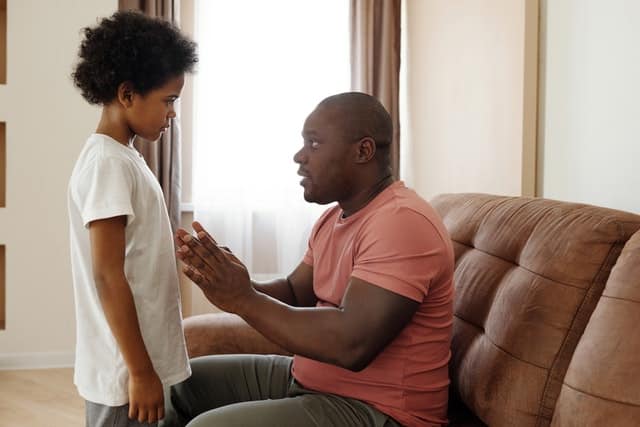Parenting is not an easy feat, especially if parents have a few pieces of baggage to deal with themselves first due to how they were brought up in their childhood. A lot of parents are responding from what they experienced themselves as children, and many people bring that unknowingly into their parenting style. So unless you’ve taken the time to pause and ask yourself, what do you want? Do you want to replace everything that you experienced as a child or not? Most parents copy and paste and do the same thing.

Also, looking into why do some adults behave the way they do? Why are they lashing out at their children for specific reasons, repeatedly? This can be because there’s a little child still in you as an adult; and if that child was not properly nurtured, loved, and have their emotional needs met; then becomes an adult, gets married, have children, but that child in you has not disappeared, he or she is still there. And that pain, many times starts to come back to the surface and parents find themselves reacting without even knowing that’s what was pushing them.
So reparenting means thinking about yourself as your young child, and talk to yourself with love; some of us are so mean to ourselves and the things we say to ourselves or how we judge ourselves, we would never talk to somebody else like that. As a parent, if you think of yourself as the young child in you and you feel worried, fear, or anxious; and you talk to that younger self with an umbrella of love, you will just start to be kinder to yourself, and then that will flow out into your children and family as well.
How to come to terms with parenting issues
The first thing to acknowledge as a parent in this regard is to accept that we have issues like everybody else. Everybody has issues of some form or the other because life is not perfect; nobody’s parents are perfect, nobody’s school was perfect, nobody’s teachers were perfect. So because of that, there will always be something that you find that is your soft spot or your pain area. So the sooner we realize it from that aspect, that it doesn’t make us special, or it doesn’t mean that there’s something wrong with us; when we say, “you know what, there are some areas around me that I would like to work on”, “there’s some areas I find are not my most empowered state”, or “I’m not at my best when I feel like this”; the better it is for us as individuals and parents.
Activating our Emotional Intelligence
This is where emotional intelligence comes in, but most of us are not taught about emotional intelligence. We are taught to go to school, pass, and get good grades; so that we can get a job, and that’s largely how life is programmed. But that ability to pause, pay attention to our emotions, know why we’re feeling this way or that way; and then know how to change ourselves, or our mindset, if it’s not serving us. All of that has to be an internal compass that we activate so that when we do that, we will continue to get better over time. But if we as parents, we just react when we’re feeling bad, shout, get angry, scream; when our child upsets us, we beat them, we’re always lashing out.

Unlearning and Relearning
To be an intentional parent, you have to acknowledge that there’s a way for you to be a better parent and a more effective parent. And doing that means that there are certain things that you are willing to unlearn and relearn. As a parent, for you to navigate this digital age, you need to accept that the things you need to repeat and continue to rehash are slightly different; and this is because of the world that we live in. It doesn’t mean that you shouldn’t have values or raise children with the right character and integrity, but you have to do things differently.
How to answer your Child’s questions
The first thing is, how to answer when your children ask you a question. Some parents find themselves shouting “Come on! Stop asking me that question”. And maybe you shout because if you don’t have the answer, you feel that it will make you look dumb; and because somehow you’ve grown up in an environment where you asked questions, and your parents did not know the answer and they shut you up. You have grown up with the idea that children should not be heard, only seen. Children nowadays are not scared of asking questions unless a child has been beaten into submission. Most children are very bold, they will ask you a question; they want to know the answer. If you say you don’t know, they don’t think you are dumb, they just believe that you are being honest.
What you as a parent can then do is say, “You know what? That’s a great question, but I’m not sure I don’t know the answer”; then you have two options, One option is to say, “let’s figure out the answer together”; that’s where you can navigate to Google or wherever together? And the second option, depending on the type of question; if it’s a very sensitive question, you can say, “you know what, give me a little bit of time to get back to you on that”; and then make sure you get back to them.
Parents have to unpack that programming that says a parent is supposed to have all the answers; sometimes you don’t. But your role as a parent is that you should be able to get the right answer for them. Whether you know it or not, you can then go and find out what the right answer is.
Reparenting from Childhood Trauma
First thing is to identify that something from your childhood is affecting your parenting. So now the next question is, what do you want to do with it? Journaling is a good way to go; putting down your thoughts, but in this case, we should journal differently. Some people use journaling, to be a record of all their trauma, sadness, and happiness. You have to journal from a place of “what do you want to replace it with your trauma with?” So you can start journaling by identifying that you are not close with your child due to a list of problems. But don’t stay in that place; you then want to say, “what are some of the things that I would have wished were done instead”; identify those things, and then say, “what can I do to improve my relationship with my child today?”

You can then start to do those things as a parent and your journaling can start building on that; start saying; “It’s been one week, and I’m seeing a difference, my child and I can now sit down together and play a game and laugh”. By doing this, you have successfully reparented yourself, and also parent your child.
Conclusion
To be a better, more effective parent is not overnight. And the only way for you to be a better parent is to realize that there’s work to be done and that you can do it. It’s just about taking baby steps; one by one, bit by bit, and opening your mind to the fact that your children deserve the best of you; and you deserve the best of you. So with that in mind, it becomes fun, it becomes an exciting journey; where every day is like “wow, I’m doing this”. No matter who you are, or what you have faced growing up, you can improve.
This article was culled from our Parenting Today radio show on LagosTalks FM with Yetty Williams. Join the conversation by tuning in every Thursday at 12:30 PM to 91.3FM.

